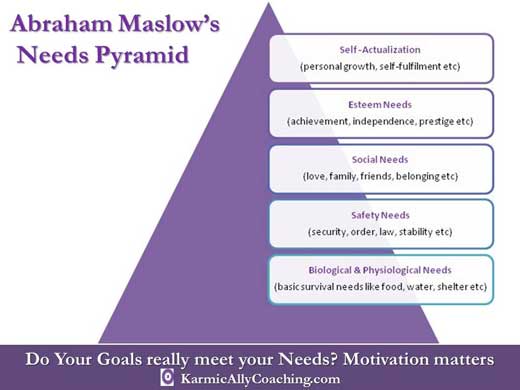This post has already been read 4652 times!

There’s a reason I’m asking whether the goals you are setting are really fulfilling a need. It’s an important reason when it comes to successful goal achievement.
Picture this in your mind.
You have a goal. You have read all about SMART goals.
You tweak your goal to be SMART and set off to achieve it.
Somewhere along the way, you realize that you are not getting the results that you want. Other more important matters keep taking precedence. You start to lose your motivation.
End result, you give up your goal, SMART or not. SMART Goals are great. But when the goal does not take into account the person’s or teams needs, capabilities and strengths, then it becomes a not so SMART goal.
Think about relay races. To the outsider, it may appear that four people are running a particular distance in quick time and handing over the baton at each lap. The team with the fastest time who doesn’t drop the baton wins. Right?
Wrong!!!
The coach and the relay team would have spent hours assessing the importance of placement of each team member in the relay. Who can give the fastest lead, who can sustain the middle laps and who has the ability to sprint the team to glory? Each member’s strengths and weaknesses would have been scrutinized with nothing being left to chance. No wonder sportsmen are gracious whether they win or lose and say that the better team, NOT the best team won.
Without a shadow of a doubt, all teams and their coaches would have gone through their own SWOT analysis but there is one more factor that creates the difference. That factor is called level of Motivation.
My point is, before setting off to make Goals it is more important to understand oneself and what makes one tick. Once you know what motivates you, half the journey is done and then it is simply going through the motions to success.
Veteran goal setters know that motivation is a key factor to goal achievement. If your heart isn’t in it, then you lose even before the race to goal achievement starts. For example, you want to shed a few kilos and make it a goal. You might go on a diet and lose a kilo or two and then gain it back.
However, if you have a motivating factor, like a health reason or looking good for a particular occasion and you know how much to lose with a specific timeline, you improve the chances of goal achievement.
In the process, you set up a SMART goal.
SMART Goal & SWOT Analysis, you need this X Factor for Success
Abraham Maslow’s pyramid called the Hierarchy of Needs Motivational Model (see diagram) states that unsatisfied needs motivate people. There is a hierarchy of these needs and until the lower needs are met, the person does not advance to the higher needs.

Maslow’s model was based on 5 needs. The base of the pyramid comprises the lower-end needs that must be fulfilled before the higher end needs start to influence your motivation.
The four levels (lower-order needs) are considered physiological needs, while the top level is considered growth needs. Maslow’s hierarchy implies that the lower level needs need to be satisfied before higher-order needs can influence behavior.
In other words, if you are suddenly made redundant and need to find a job to avoid foreclosure of your mortgage, you really would not be interested in pursuing self-actualization needs until you have secured your physiological and safety needs.
From a goal setting perspective, Maslow’s model can provide invaluable input in identifying target areas for your goal setting as well as the areas that can prove to be stumbling blocks while you try to achieve your goals.
Coming back to the weight loss example, if the ultimate goal motivation based on Esteem needs is not compromising your Biological needs of food or any of the other lower needs, you stand a better chance.
In other words, going on a diet does not mean going into starvation mode or spending hours at the gym, but ensuring that the approach does not affect any of the lower level needs resulting in self-created roadblocks thus allowing you to focus on a higher need with the right motivation.
Coming full circle to the question, what about you? Do your goals really meet your needs?
If you are a DIY fan, then this Kindle book has been written just for you. It also includes a gift of special goal setting and achieving forms because your success matters – to me.





 I adhere to the Certified Coaches Alliance Code of Ethics and Standards. A copy is available on request.
I adhere to the Certified Coaches Alliance Code of Ethics and Standards. A copy is available on request.
 Let's Talk through the Connect Form:
Let's Talk through the Connect Form:
Excellent way Vatsala to combine Maslow’s hierarchy of needs with goals. There’s so much emphasis on goals, that the motivation factor is overlooked. If you’re not motivated, goals don’t get accomplished. Tying it into “needs” changes the motivation dynamic and makes sense. I do something similar in identifying needs when I teach about decision making, which seems to work out quite well.
I love the way you’ve captured the message of this post, Joyce. Goals without the right level of motivation and intensity of need will never work, no matter how many tools we have at our disposal.
Wonderful post Vatsala. I believe taking the time to determine what motivates us to be and do our very best is so important and it’s a step many people skip over. Thank you for so clearly explaining this process.
Thank you Marquita. It’s the same in business. We need to know our Big Why to keep us motivated and moving forward when things aren’t working out the way we expected them to. Definitely not a step to skip when it comes to personal goals.
So many interesting points in this post, Vatsala! As I create my team at AtoZ Healing Space, your discussion of the relay team really resonated in terms of matching up the task with the right talent. I really also enjoyed Maslow’s Needs Pyramid. I feel that if I don’t get that relay part right (task delegation) then my own needs start sliding up and down the scale! Funny how that works, huh?
It is said that a team is as strong as the weakest link, Reba. All the more reason to tap into the talents of the team for the right task and delegate effectively. Maslow’s Pyramid is as relevant today as it was when he first published it and we can learn a lot from it about our motivation to achieve the goal – no matter what it takes.
Don’t you just love Maslow, Vatsala! I study and talk about him a lot, and what a great place to begin when talking about motivation. It’s always helpful to assess where one is right now to find true motivation.
Love this!
I do love Maslow, Susan. 🙂 Mindset is important for goal achievement in any area of life but it’s what motivates us that determines success or failure. Quite often a failure in 1 goal isn’t because we didn’t work hard on it but there was another goal or need that needed to be fulfilled in priority. I have an entire chapter in my book that assesses the motivation for fulfilling specific needs before even thinking of SMART Goals.